#Lit Review
Text
Summary: Chapter 4 of Critical Intersex
For many of us, Chapter 4 of Critical Intersex (2009) turned out to be a particularly rich source of information about intersex history. So I (Elizabeth) have decided to give a fairly detailed summary of the chapter because I think it’s important to get that info out there. I’m gonna give a little bit of commentary as I go, and then a summary of our book club discussion of the chapter.
The chapter is titled “(Un)Queering identity: the biosocial production of intersex/DSD” by Alyson K. Spurgas. It is a history of ISNA, the Intersex Society of North America, and how it went from being a force for intersex liberation to selling out the movement in favour of medicalization. (See here for summary of the other chapters we read of the book!)
Our high level reactions:
Elizabeth (@ipso-faculty): Until I read chapter 4, I didn't really realise how reactionary “DSD” was. It hadn't been clear to me how much it was a response to the beginning of an organized intersex advocacy movement in the United States.
Michelle (@scifimagpie): I could feel the fury in the writer's tone. It was a real barn burner.
Also Michelle: the fuckin' respectability politics of DSD really got under my skin, as a term! I know the importance, as a queer person, of not forcing people to ID as queer, but this was a lot.
Introducing the chapter
The introduction sets the tone by talking about how in the Victorian era there was a historical shift from intersex being a religious/juridical issue to a pathology, and how this was intensified in the 1950s with John Money’s invention of the optimal gender rearing model.
Spurgas briefly discusses how the OGR model is harmful to intersex people, and how it iatrogenically produces sexual dysfunction and gender dysphoria. “Iatrogenic” means caused by medicine; iatrogenesis is the production of disease or other side-effects as a result of medical intervention.
This sets scene for why in the early 1990s, Cheryl Chase and other intersex activists founded the Intersex Society of North America (ISNA). It had started as a support group, and morphed significantly over its lifetime. ISNA closed up shop in 2008.
Initially, ISNA was what we’d now call interliberationist. They were anti-pathologization. Their stance was that intersexuality is not itself pathological and the wellbeing of intersex people is endangered by medical intervention. They organized around the abolition of surgical intervention. They also created fora like Hermaphrodites With Attitude for the deconstruction of bodies/sexes/genders and development of an intersex identity that was inherently queer.
The early ISNA activists explicitly aligned intersexuality in solidarity with LGB and transgender organizing. There was a belief that similar to LGBT organizing, once intersex people got enough visibility and consciousness-raising, people would “come out” in greater numbers (p100).
By the end of the 90s, however, many intersex people were actively rejecting being seen as queer and as political subjects/actors. The organization had become instead aligned with surgeons and clinicians, had replaced “intersex” with “DSD” in their language.
By the time ISNA disbanded in 2008 they had leaned in hard on a so-called “pragmatic” / “harm reduction” model / “children’s rights perspective”. The view was that since infants in Western countries are “born medical subjects as it is” (p100)
Where did DSD come from?
In 2005, the term “disorders of sexual differentiation” had been recently coined in an article by Alice Dreger, Cheryl Chase, “and three other clinicians associated with the ISNA… [so as] to ‘label the condition rather than the person’” (p101). Dreger et al thought that intersex was “not medically accurate” (p101) and that the goal should be effective nomenclature to “sort patients into diagnostically meaningful groups” (p101).
Dreger et al argued that the term intersex “attracts the interest of a large number of people whose interest is based on a sexual fetish and people who suffer from delusions about their own medical histories” (Dreger et al quoted on p101)
Per Spurgas, Dreger et al had an explicit agenda of “distancing intersex activism from queer and transgressive sex/gender politics and instead in supporting Western medical productions of intersexuality” (p102). In other words: they were intermedicalists.
According to Dreger et al, an alignment with medicine is strategically important because intersex people often require medical attention, and hence need to be legible to clinicians. “For those in favor of the transition to DSD, intersex is first and foremost a disorder requiring medical treatment” (p102)
Later in 2005 there was a “Intersex Consensus Meeting” organized by a society of paediatricians and endocrinologists. Fifty “experts” were assembled from ten countries (p101)... with a grand total of two actually intersex people in attendance (Cheryl Chase and Barbara Thomas, from XY-Frauen).
At the meeting, they agreed to adopt the term DSD along with a “‘patient-centred’ and ‘evidence-based’ treatment protocol” to replace the OGR treatment model (p101)
In 2006, a consortium of American clinicians and bioethicists was formed and created clinical guidelines for treating DSDs. They defined DSD quite narrowly: if your gonads or genitals don’t match your gender, or you have a sex chromosome anomaly. So no hormonal variations like hyperandrogenism allowed.
The pro-DSD movement: it was mostly doctors
Spurgas quotes the consortium: “note that the term ‘intersex’ is avoided here because of its imprecision” (p102) - our highlight. There’s a lot of doctors hating on intersex for being a category of political organizing that gets encoded as the category is “imprecise” 👀
Spurgas gets into how the doctors dressed up their re-pathologization of intersex as “patient centred” (p103) - remember this is being led by doctors, not patients, and any intersex inclusion was tokenistic. (Elizabeth: it was amazing how much bs this was.)
As Spurgas puts it, the pro-DSD movement “represents an abandonment of the desire for a pan-intersexual/queer identity and an embrace of the complete medicalization of intersex… the intersex individual is now to be understood fundamentally as a patient” (p103)
Around the same time some paediatricians almost came close to publicly advocating against infant genital mutilation by denouoncing some infant surgeries. Spurgas notes they recommended “that intersex individuals be subjected (or self-subject) to extensive psychological/psychiatric, hormonal, steroidal and other medical” interventions for the rest of their lives (p103).
This call to instead focus on non-surgical medical interventions then got amplified by other clinicians and intermedicalist intersex advocacy organizations.
The push for non-surgical pathologization hence wound up as a sort of “compromise” path - it satisfied the intermedicalists and anti-queer intersex activists, and had the allure of collaborating with doctors to end infant surgeries. (Note: It is 2024 and infant surgeries are still a thing 😡.)
The pro-DSD camp within the intersex community
Spurgas then goes on to get into the discursive politics of DSD. There’s some definite transphobia in the push for “people with DSDs are simply men and women who happen to have congenital birth conditions” (p104). (Summarizer’s note: this language is still employed by anti-trans activists.)
The pro-DSD camp claimed that it was “a logical step in the ‘evolution in thinking’” 💩 and that it would be a more “humane” treatment model (p105) 💩
Also that “parents and doctors are not going to want to give a child a label with a politicized meaning” (p104) which really gives the game away doesn’t it? Intersex people have started raising consciousness, demanding their rights, and asserting they are not broken, so now the poor doctors can’t use the label as a diagnosis. 🤮
Spurgas quotes Emi Koyama, an intermedicalist who emphasized how “most intersex people identify as ‘perfectly ordinary, heterosexual, non-trans men and women’” (p104) along with a whole bunch of other quotes that are obviously queerphobic. Note from Elizabeth: I’m not gonna repeat it all because it’s gross. In my kindest reading of this section, it reads like gender dysphoria for being mistaken as genderqueer, but instead of that being a source of solidarity with genderqueers it is used as a form of dual closure (when a minority group goes out of its way to oppress a more marginalized group in order to try and get acceptance with the majority group).
Koyama and Dreger were explicitly anti-trans, and viewed intergender type stuff as “a ‘trans co-optation’ of intersex identity” (p105) 🤮
Most intersex people resisted “DSD” from its creation
On page 106, Spurgas shifts to talking about how a lot intersex people were resistant to the DSD shift. Organization Intersex International (OII) and Bodies Like Ours (BLO) were highly critical of the shift! 💛 BLO in particular noted that 80-90% of their website users were against the DSD term. Note from Elizabeth: indeed, every survey I’ve seen on the subject has been overwhelmingly against DSD - a 2015 IHRA survey found only 3% of intersex Australians favoured the DSD term.
Proponents of “intersex” over “DSD” testified to it being depathologizing. They called out the medicalization as such: that it serves to reinforce that “intersex people don’t exist” (David Cameron, p107), that it is damaging to be “told they have a disorder” (Esther Leidolf, p107), that there is “a purposeful conflation of treatment for ‘health reasons’ and ‘cosmetic reasons’ (Curtis Hinkle, p107), and that it’s being pushed mainly by perisex people as a reactionary, assimilationist endeavour (ibid).
Interliberationism never went away - intersex people kept pushing for 🌈 queer solidarity 🌈 and depathologization - even though ISNA, the largest intersex advocacy organization, had abandoned this position.
Spurgas describes how a lot of criticism of DSD came from non-Anglophone intersex groups, that the term is even worse in a lot of languages - it connotes “disturbed” in German and has an ambiguity with pedophilia and fetishism in French (p111).
The DSD push was basically entirely USA-based, with little international consultation (p111). Spurgas briefly addresses the imperialism inherent in the “DSD” term on pages 118/119.
Other noteworthy positions in the DSD debate
Spurgas gives a well-deserved shout out to the doctors who opposed the push to DSD, who mostly came from psychiatry and opposed it on the grounds that the pathologization would be psychologically damaging and that intersex patients “have taken comfort (and in many cases, pride) in their (pan-)intersex identity” (p108) 🌈 - Elizabeth: yay, psychiatrists doing their job!
Interestingly, both sides of the DSD issue apparently have invoked disability studies/rights for their side: Koyama claimed DSD would herald the beginning of a disability rights based era of intersex activism (p109) while anti-DSDers noted the importance in disability rights in moving away from pathologization (p109).
Those who didn’t like DSD but who saw a strategic purpose for it argued it would “preser[ve] the psychic comfort of parents”, that there is basically a necessity to coddle the parents of intersex children in order to protect the children from their parents. (p110)
Some proposed less pathologizing alternatives like “variations of sex development” and “divergence of sex development” (p110)
The DSD treatment model and the intersex treadmill
Remember all intersex groups were united that sex assignment surgery on infants needs to be abolished. The DSD framework that was sold as a shift away from surgical intervention, but it never actually eradicated it as an option (p112). Indeed, it keeps ambiguous the difference between medically necessary surgical intervention and culturally desired cosmetic surgery (p112). (Note from Elizabeth: funny how *this* ambiguity is acceptable to doctors.)
What DSD really changed was a shift from “fixing” the child with surgery to instead providing “lifelong ‘management’ to continue passing” (p112), resulting in more medical intervention, such as through hormonal and behavioural therapies to “[keep] it in remission” (p113).
Cheryl Chase coined the “intersex treadmill’: the never-ending drive to fit within a normative sex category (p113), which Spurgas deploys to talk about the proliferation of “lifelong treatments” and how it creates the need for constant surveillance of intersex bodies (p114). Medical specialization adds to the proliferation, as one needs increasingly more specialists who have increasingly narrow specialties.
There’s a cruel irony in how the DSD model pushes for lifelong psychiatric and psychological care of intersex patients so as to attend to the PTSD that is caused by medical intervention. (p115) It pushes a capitalistic model where as much money can be milked as possible out of intersex patients (p116).
The DSD treatment model, if it encourages patients to find community at all, hence pushes condition-specific medical support groups rather than pan-intersex advocacy groups (p115)
Other stuff in the chapter
Spurgas does more Foucault-ing at the end of the chapter. Highlight: “The intersex/DSD body is a site of biosocial contestation over which ways of knowing not only truth of sex, but the truth of the self, are fought. Both intelligibility and tangible resources are the prizes accorded to the winner(s) of the battle over truth of sex” (p117)
There’s some stuff on the patient-as-consumer that didn’t really land with anybody at the book club meeting - we’re mostly Canadians and the idea of patient-as-consumer isn’t relatable. Ei noted it isn’t even that relatable from their position as an American.
***
Having now summarized the chapter, here's a summary of our discussion at book club...
Opening reactions
Michelle (M): the way the main lady involved became medicalized really made my heart sink, reading that.
Elizabeth (E): I do remember some discussion of intersex people in the 90s, and it never really grew in the way that other queer identities did! This has kind of helped for me to understand what the fuck happened here.
E: It was definitely a very insightful reading on that part, while being absolutely outraging. I didn't know, but I guess I wasn't surprised at how pivotal US-centrism was. The author was talking about "North American centric" though but always meant the United States!!! Canada was just not part of this! They even make mention of Quebec as separate and one of the opposing regions. I was like, What are you doing here, America? You are not the entirety of our continent!!!
E: The feedback from non-Anglophone intersex advocates that DSD does not translate was something that I was like, "Yes!" For me, when I read the French term - that sounded like something that would include vaginismus, erectile dysfunction - it sounds far more general and negative.
M: the fuckin' respectability politics of DSD really got under my skin, as a term! I know the importance, as a queer person, of not forcing people to ID as queer, but this was a lot.
E: it was very assimilationist in a way that was very upsetting. I knew intellectually that this was going on. There was such a distinct advocacy push for that. The coddling of parents and doctors at the expense of intersex people was such a theme of this chapter, in a way that was very upsetting. They started out with this goal of intersex liberation, and instead, wound up coddling parents and doctors.
Solidarities
M: I feel like there's a real ableist parallel to the autism movement here… It dovetails with how the autism movement was like, "Aww, we're sorry about your emotionless monster baby! This must be so hard for you [parents]!" And it felt like "aw, it's okay, we'll fix your baby so they can interface with heterosexuality!" [Note: both of us are neurodivergent]
E: A lot of intersexism is a fear that you're going to have a queer child, both in terms of orientation and gender.
E: You cannot have intersex liberation without putting an end to homophobia and transphobia.
M: We're such natural allies there!
E: I understand that there are these very dysphoric ipsogender or cisgender people, who don't want to be mistaken as trans, but like it or not, their rights are linked to trans people! When I encounter these people, I don't know how to convey, "whether you like it or not, you're not going to get more rights by doing everything you can to be as distant as possible."
M: it reminds me of the movements by some younger queers to adhere to respectability politics.
E: Oh no. There are younger queers who want respectability politics????
M: well, some younger queers are very reactionary about neopronouns and kink at pride. they don't always know the difference between representation and "imposing" kinks on others. In a way, it reminds me of the more intentional rejection of queer weirdos, or queerdos, if you will, by republican gays.
E: I feel like a lot of anti-queerdom that comes out of the ipso and cisgender intersex community reads as very dysphoric to me. That needs to be acknowledged as gender dysphoria.
M: That resonates to me. When I heard about my own androgen imbalance, I was like, "does that mean I'm not a real woman?" And now I would happily say "fuck that question," but we do need an empathy and sensitivity for that experience. Though not tolerance for people who invalidate others, to be honest.
E: The term "iatrogensis" was new to me. The term refers to a disease caused or aggravated by medical intervention.
M: So like a surgical complication, or gender dysphoria caused by improper medical counselling!
The DSD debate
ei: i think the "disorder" discussion is really interesting. in my opinion, if someone feels their intersex condition is a disorder they have every right to label it that way, but if someone does not feel the same they have every right to reject the disorder label. personally i use the label "condition". i don't agree with forcing labels on anyone or stripping them away from anyone either.
M: for me, it felt like a cautionary tale about which labels to accept.
ei: i'm all around very tired of people label policing others and making blanket statements such as "all people who are this have to use this label”... i also use variation sometimes, i tend to go back and forth between variation and condition. I think it's a delicate balance between being sensitive to people's label preferences vs making space for other definitions/communities.
We then spoke about language for a bunch of communities (Black people, non-binary people) for a while
E: one thing that was very harrowing for me about this chapter is that while there was this push to end coercive infant surgery, they basically ceded all of the ground on "interventions" happening from puberty onward. And as someone who has had to fight off coercive medical interventions in puberty, I have a lot of trauma about violent enforcement of femininity and the medical establishment.
ei: i completely agree that it's psychologically harmful tbh…. i was assigned male at birth and my doctors want me to start testosterone to make me more like a perisex male. which is extremely counterproductive because i'm literally transfem and have expressed this many times
Doctors Doing Harm
M: for me, the validation of how doctors can be harmful in this chapter meant a lot.
E: something that surprised me and made me happy was that there were some psychiatrists who spoke out against the DSD label. As someone who routinely hears a lot of anti-psychiatry stuff - because there's a lot of good reason to be skeptical of psychiatry, as a discipline - it was just nice to see some psychiatrists on the right side of things, doing right by their patients. Psychiatrists were making the argument that DSD would be psychologically harmful to a lot of intersex people.
ei: like. being told that something so inherently you, so inherently linked to your identity and sense of self, is a disorder of sexual development, something to be fixed and corrected. that has to be so harmful
ei: like i won't lie i do have a lot of severe trauma surrounding the way i've been treated due to being intersex. but so much of my negative experiences are repetitive smaller things. Like the way people treat me like my only purpose is to teach them about intersex people …. either that or they get really creepy and gross. I’m lucky in that i'm not visibly intersex, so i do have the privilege of choosing who knows. but there's a reason why i usually don't tell people irl.
M: intersex and autism have overlap again about how like, minor presentation can be? As opposed to the sort of monstrous presentation [Carnival barker impression] "Come see the sensational half-man, half-woman! Behold the h-------dite!" And like - the way nonverbal people are also treated feels relevant to that, because that's how autism is often treated, like a freakshow and a pity party for the parents? And it's so dehumanizing. And as someone who might potentially have a nonverbal child, because my wife is expecting and my husband and she both have ADHD - I'm just very fed up with ableism and the perception of monstrosity.
Overall, this was a chapter that had a lot to talk about! See here for our discussion of Chapters 5-7 from the same volume.
#intersex#intersex studies#queer theory#gender studies#actually intersex#intersex rights#intersex activism#intersex books#book reviews#book summaries#paper summaries#lit review#critical intersex#intersex history
52 notes
·
View notes
Text
"The schizoid patient may rebel against becoming a mere object through oppositionalism, defiance, and omnipotent control. The work situation is often particularly trying because there is the danger of becoming petrified into the work role [...]
The work of Winnicott would suggest that the idea of playing a role but not fully becoming the role is not an indication of pathology. The problem for the schizoid patient is that he cannot "play" at the role. The role is taken too seriously, the schizoid becomes fully identified with it. One may securely play at a role and identify with it only if one is not afraid of losing oneself in it [...]
I recall a schizoid patient who found a job as a clerk. Immediately, he wanted to quit. He did not want to be a clerk for the rest of his life. In a state of agitation, he obsessed about various jobs he might try. He would not act the part of a clerk. Although he had not shown any great interest in art previously, he fantasized about being an artist who was working as a clerk. In this way, he could continue to function in the role of clerk. Sartre notes that a salesperson who responds to the public as an artist, and who dreams of being an artist, becomes offensive to the patrons."
Jeffery Seinfeld- The Empty Core: An Object Relations Approach to Psychotherapy of the Schizoid Personality
#i know theres someone else who already posted a lot from this book but im reading it now and i want to post the parts i like myself as well#info#szpd#lit review
11 notes
·
View notes
Photo

The Prom Queen was an exceptionally fun and bloody romp through Shadyside. It pulled off having a large cast of characters much better than many of its Fear Street predecessors, at least so far as the five prom queen candidates went. I can’t say the same for the boy characters; they all kinda blended together aside from being suspects. There are also some great examples in this book of how you don’t have to be a killer to be a total fucking creep. It was kinda funny how the students and parents were all anxious about the recent murders in Shadyside, as though murders don’t happen there all the time. It was also pretty ridiculous that the school would put on a play and do the prom on the same weekend. I mean, Shadyside is hardly a normal town, but maybe this was a tradition in some high schools. I can’t say for sure. It sounds like a logistical nightmare to me. In fact, I would say my biggest issues with the book were the baffling decisions made by the minor adult characters. I was pleasantly surprised by the twist at the end. That alone elevates this book for me. The plot may have followed a familiar Fear Street formula, but I felt like The Prom Queen was one of the best-executed books to use it.
Score: 4
Find my full review with spoilers snark, and memes over on my blog:
https://www.danstalter.com/the-prom-queen/
#fear street#booksbooksbooks#books#book reviews#lit review#book revie#nostalgia#fits of nostalgia#rl stine#retro reads#90s kids#bookshelf#book photography#prom#prom queen#ya horror#horror#teen screams#teen horror#90s teens#paperbacks from hell
12 notes
·
View notes
Text

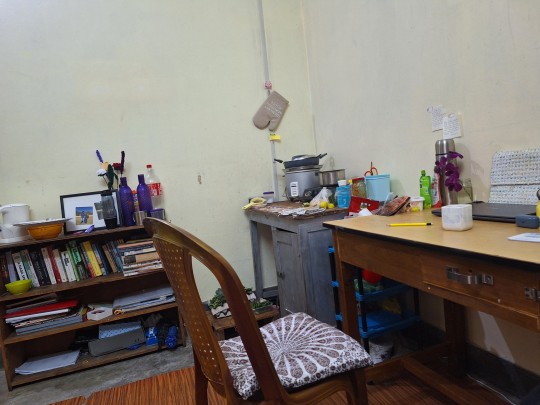
Hello there,
From the last post to now, life update is I'm pursuing PhD now. With confusion, self doubt, procrastination and at times taking pride in what I'm currently doing, I'm at that stage where I need to complete it. So here's me starting a 100dop to start that writing, to start those ideas flowing on paper or documents I've opened :D.
Because today is not day One but neither have I done much let's call it Day 4 of 100 dop :)
Note I won't go counting every next day but according to each day when being productive until I reach 100 as an attempt to be consistent.
Cheers<3
2 notes
·
View notes
Text
In the Miso Soup - Ryū Murakami (Review)

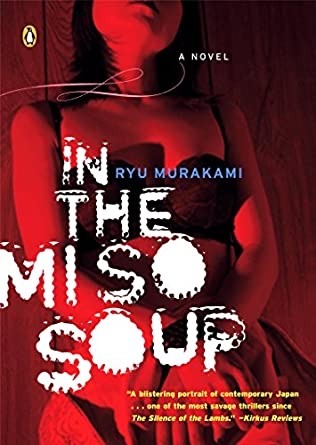
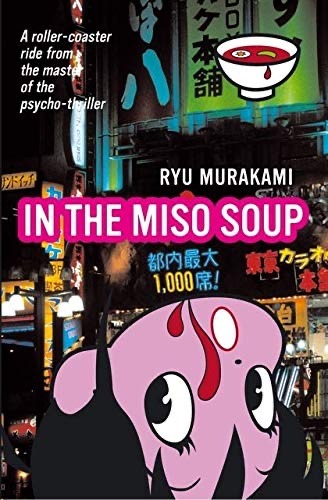
Summary: It is just before New Year’s. Frank, an overweight American tourist, has hired Kenji to take him on a guided tour of Tokyo’s sleazy nightlife. But Frank’s behavior is so strange that Kenji begins to entertain a horrible suspicion—that his new client is in fact the serial killer currently terrorizing the city. It is not until later, however, that Kenji learns exactly how much he has to fear and how irrevocably his encounter with this great white whale of an American will change his life.
Review: The first half of the book is a slow-rise build of unnerving tension. At moments, I had never felt such unease while reading something. The narrative kept me wondering, stringing me along while Kenji spirals to discover the truth behind his client’s nature. Only at the climax does the true horror of the situation finally and fully sink in. However, the events that unfold in the book’s last third feel dissatisfying. The dialogue that ensues may be thought-provoking, but the way it structures the story’s end left me feeling like something was lacking. Even so, I believe this book is an unforgettable experience due to its near-masterful grasp of creating suspense and thrilling the reader up to its peak of events.
3/5
15 notes
·
View notes
Text
What happened here? Are they lovers or mortal enemies?
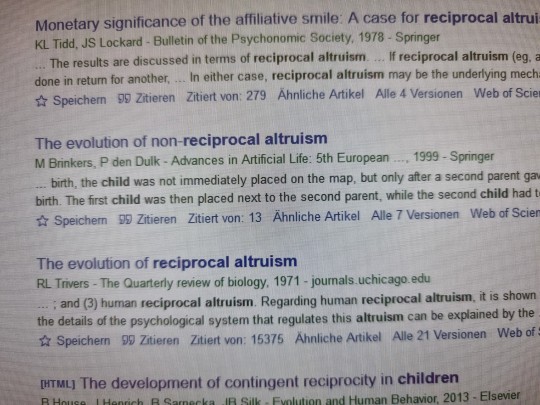
#phd#lit review#trivers is super famous#don't know about brinkers but that isn't saying much#just thought those 2 titles right underwear each other were funny
6 notes
·
View notes
Text
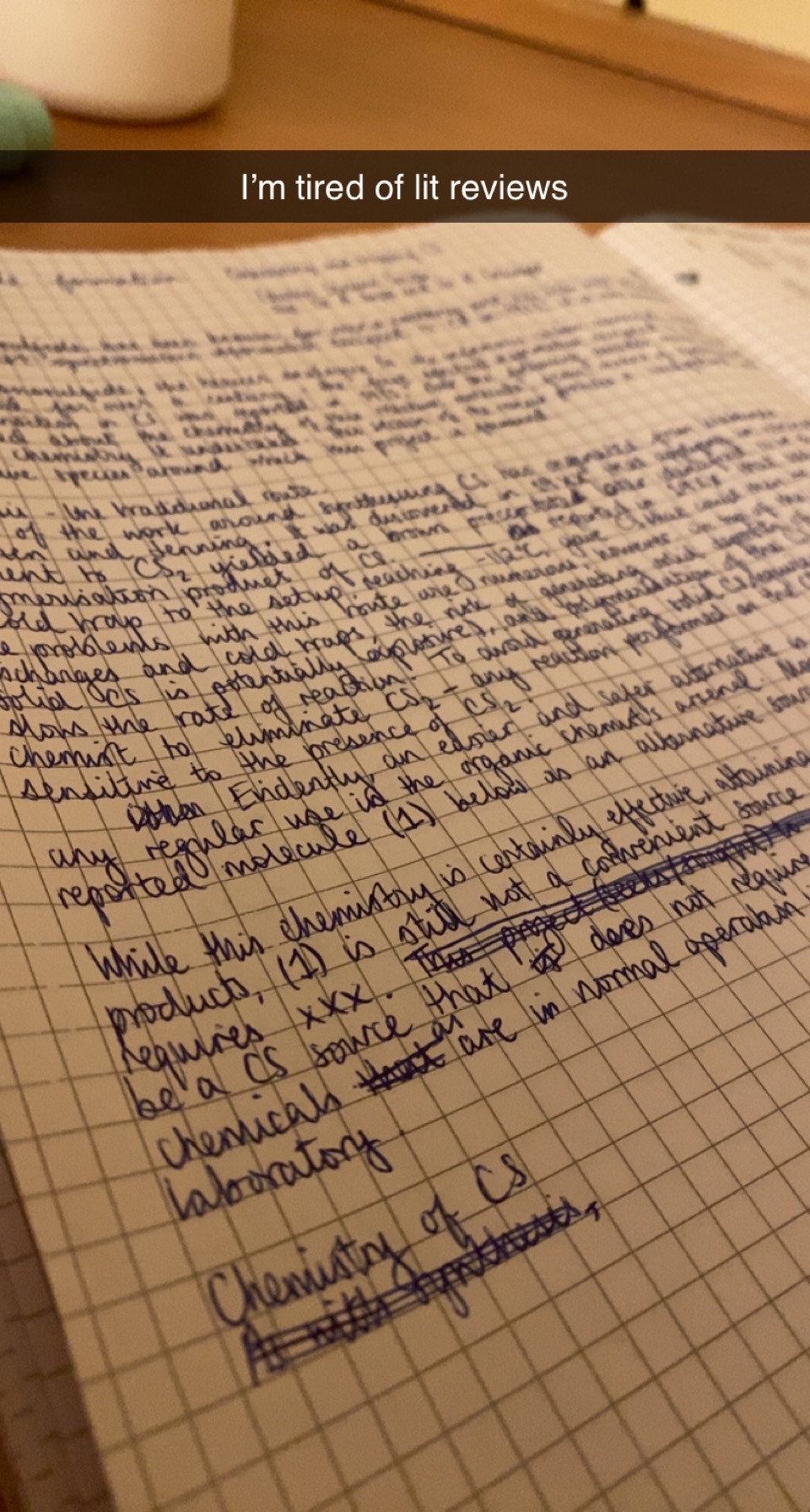
24/10/22
My fourth and final year is in full swing! To get started on big documents like literature reviews for my thesis, I find it easier to just start writing. Pen to paper, because I’m an old-fashioned girl (and Word is annoying when you need sub- and superscripts and words you don’t find in a dictionary, as does a chemist). I was then able to overcome the paralysis and start typing the actual thing.
(This was a brain dump — what do I know and where did I get the information from? What do I need to look up that should go into the review?)
Sorry for the absence lol
13 notes
·
View notes
Text
youtube
Literature Review as Academic Genealogy
2 notes
·
View notes
Text
Turtles All The Way Down by John Green
Turtles All the Way Down brought me back to the prime of John Green days, early high school, with "Looking for Alaska", "Paper Towns", and fan favorite "The Fault in Our Stars". It is an honest story with more action than I expected. 4/5 stars.
My Rating: 4/5 Stars
Good reads rating: 3.91/5 stars
Cover description: “It all begins with a fugitive billionaire and the promise of a cash reward. Turtles All the Way Down is about lifelong friendship, the intimacy of an unexpected reunion, Star Wars fan fiction, and tuatara. But at its heart is Aza Holmes, a young woman navigating daily existence within the ever-tightening spiral of her own…

View On WordPress
#Best New Books#Book recomendations#Book Reviews#books#John Green#Lit Review#Literature Reviews#New Books#Turtles All The Way Down#Turtles All The Way Down by John Green#YA Books#Young Adult Books
3 notes
·
View notes
Text

6/10/22 - started the write-up of my master's lit review from my onenote rough research notes. I had a bit of a pain flare-up over the week so I'm trying to balance productivity with pomordos and breaks! 🍅
#feeling a little behind but trying to be gentle with myself#it's only been 2 weeks tbf of reading and writing#biochemistry#biology#studyblr#lit review#my posts#research#omg... guess i'm back on studyblr for biology after 3 years aha
4 notes
·
View notes
Text
Inventing Reality: The Politics of the Mass Media by Michael Parenti
Chapter 4:
Mass media advertising is a recent phenomenon with the purpose of encouraging consumerism. Advertisements tell consumers that they are not cooking/cleaning/dressing/etc. correctly and try to make them dependent on corporate products.
"Along with products, the corporations sell themselves" [p. 67] as well as selling capitalism and Western values in general. Companies create ads that tell people how they are helping society, and sometimes that simply show the American way of life in a positive light.
Media companies that publish advertisements are not obligated to inform consumers if ads are false or misleading.
Public interest groups and labor unions can't match corporations' abilities to advertise, due both to having less money and occasionally having media companies refuse to print/broadcast their ads.
3 notes
·
View notes
Text
Summary: Chapters 5-7 of Critical Intersex
After our first foray into academic intersex studies, people were curious for more, so for November we read a subset of the edited volume Critical Intersex. It was published in 2009 and was edited by Morgan Holmes, an intersex sociologist. We read Chapters 4-7.
As it turned out, Chapters 5-7 were all fairly similar - they all went over the modern-era history of intersex from a legal/bureaucratic perspective in The Netherlands (Ch 5), and Germany (Ch 6 & 7). Chapter 4 was on the history of the Intersex Society of North America.
We’re gonna split the book/discussion summary into two posts - this one for Chapters 5-7 and a separate post for Chapter 4.
First, some quick summaries of the chapters:
Ch 5: Do I Have XY Chromosomes? By Margriet van Heesch
This chapter provides a history of how AIS has been treated by doctors in the Netherlands from the 1880s to the 2000s. Treatment models changed several times during this time period, affected by shifting scientific understanding of the basis of sex as well as social changes in the late 20th century towards greater informed consent
An important shift happened in the 1960s: a new treatment model for intersex emerges, led by John Money at Johns Hopkins University in the USA. This posits that gender identity is a result of genital appearance and parenting in the early years’ of an infant/toddler’s life. They believed that the clinical goal should be to “erase all doubts about the sex of children with intersex conditions” (p123)
All three of the chapters talk about this paradigm, but none of them use a pithy name for it. As it turns out there is a name for it; its practitioners called it the optimum gender rearing model, or OGR model.
Heesch explains how the OGR model led to a dynamic where Dutch doctors would “protect” AIS women from learning that they have XY chromosomes. Women would AIS would still sometimes find out, by accident or through a lot of digging, and Heesch’s chapter focuses on interviews and life stories of women with AIS who were treated this way.
Interestingly, John Money himself argued “‘in all cases of genital deformity, whatever the diagnosis and whatever the rearing, it is psychologically advantageous to be straightforward and honest in talking with the child about the facts of his or her condition’” (p 133) - emphasis ours.
This part of Money’s treatment model did not make it into Dutch practice. Money was fairly accepting of homosexuality, whereas Dutch doctors openly declared a “wish to make intersex children into happily married adults … Medical prevention of homosexuality became disguised as the medical prevention of social problems.”
Heesch also interviewed women with AIS and relays their life stories. The stories are fairly grim and the usual sorts of stories about AIS (e.g. removing “cancerous tumours”). Notably, the women who did find out about being intersex expressed a desire to meet other women with the same condition (p138) in contrast to doctors’ approaches to hide information and connections from their patients.
Ch 6: Intersex, a Blank Space in German Law? By Angela Kolbe
In Germany, “there is no law to define what a man is, what a woman is, or how many sexes exist. the legal system simply assumes an obvious distinction between male and female, and structures laws to acknowledge only two sexes.” (p147)
As such, you cannot register a baby as as intersex, rather than female or male, on a birth certificate.
Interestingly, German law used to include a category for altvil, which Kolbe translates as “hermaphrodites”. The altvil were in German law as early as the Sachsenspiegel of 1230. The Sachsenspiegel encoded that “hermaphrodites, dwarfs and imbeciles could inherit neither land nor titles” (p149).
Kolbe then goes over a history of different laws and what they had to say about intersex people. Overall the picture is that intersex people had more limited rights than perisex people. Multiple historical laws set forth a “preponderance rule”, to assign intersex people to a binary gender based on the preponderance of sex characteristics; these laws encoded who was to make this determination and when.
Some laws (such as a law in 1794 Prussia) granted a right of choice: the intersex person (or their parents) could choose which binary gender they should be, and make a blood oath binding them to this gender. (Some laws penalized breaking this oath.)
After going through the history, Kolbe then explains the present situation in Germany. The legal challenges from intersex people, and the unwillingness of the German government to deal with it.
Kolbe describes a court case in Colombia that set a new standard: they denied the parental right to consent to surgery on intersex infants. “The court found that the parents did not really understand the implications of the operation on their child’s life.” (p159) and created a new model of “qualified and persistent informed consent”.
This Colombian model was a compromise between abolishing infant surgery and allowing parents to consent to surgery on behalf of their children - it required doctors to provide detailed information to parents, and it needs to be authorized in stages that are spread out to give “parents time to establish bonds with their child the way s/he is, and not to make a prejudicial decision based on shock at the baby’s appearance” (p159)
Kolbe discusses the Colombian model as a possible way forward for Germany, and then discusses other possible ways forward for Germany - should they make a legal third sex category? Or try to abolish gender categories in the law entirely? Kolbe details how gender is currently involved in German law and how it could be removed.
Ch 7: Who Has the Right to Change Gender Status? Drawing Boundaries between Inter- and Transsexuality by Ulrike Klöppel
In post-war Germany, the standard was to let intersex people pick their gender assignment - for infants with ambiguous sex at birth, they were given a provisional assignment. There was a clear commitment to defer plastic and hormone surgery until the intersex patient could decide what they wanted.
Klöppel documents how the “subject orientated” policy emerged in the early 1900s. Klöppel gives a history of medical treatment models in Germany, and how the subject-oriented model eventually lost out to the OGR model promoted by John Money.
Klöppel then provides a history of how trans people have been understood by German doctors, and common ground in how both trans and intersex were negatively impacted by laws that required all Germans to have a binary and unchangeable legal sex marker.
Klöppel discusses the role doctors have played in pushing back on these laws, the relationship between the law and medicine, and the history of relevant legislation in Germany in the 20th century.
Shifting now into our book club discussion...
High-level Reactions To These Chapters
Elizabeth (Eliz): I already knew the basic timeline of the social construction of sex, so that wasn't new to me. But it was new to me that the Netherlands and Germany would be so different. The doctors lying to their patients was really something. And then the Germans being like, "yeah, the intersex person gets to pick their gender!" I wasn't expecting such differences between such similar countries.
Michelle (M): I come from a medical family background, so medical ethics are familiar to me, but the concept of simply not telling a patient what they were diagnosed with is horrifying to me.
ei: i honestly didn't read very much, and there wasn't anything in particular i wanted to discuss. mostly just interested in listening in on you guys' discussion!
Doctors
Eliz: The chapters were emotionally difficult to read; reading about doctors being paternalistic is never fun. It was interesting that John Money, the guy associated with infant surgeries, advocated being open and honest with the intersex children and what had happened to them. I still don’t know what tests were done on me as an adolescent and it’s been a barrier in my care to this day.
Eliz: Another thing about the chapters is the importance physicians have on surveilling intersex people. The DSD model frames intersex as a lifelong model that requires surveillance and intersession by a team of healthcare workers.
ei: doctors HATE when intersex people are queer or trans or "weird" in another way. They expect us to all be cishet and as "normal" as possible, and that ofc includes forcing "treatments" to erase our intersex traits! I hate when i look up my variation and get hit with "men with (variation)"
Eliz: yeah doctors have appointed themselves into the job of surveilling intersex people to make sure we never deviate
M: it's gender as a police state. "You're already a recidivist. Don't you dare worsen your condition!" It's probably why doctors hate when patients band together in case "these intersex people get wrong ideas."
ei: yeah. my gender has always been seen as a medical issue, specifically one to be "corrected". i've fought consistently against so many medical "treatments" that are meant to make me more similar to a perisex person
Eliz: yeah I noticed how in one of the chapters (Ch 5) the author was like “why didn’t the doctors tell the patients how to connect with people with the same condition?” given all the evidence it’s beneficial for intersex people to do so, and how the people that author had interviewed had - upon finding out they were intersex - immediately wanted to meet others with the same condition. I don’t know if the author had been asking rhetorically but it feels like the answer is because doctors are scared if we talk to each other we might realize we’re being mistreated.
ei: I think also, they don't want intersex people to feel like their variation is okay. they want to maintain the Medically Fucked Up narrative, and they don't want us meeting other intersex people because we might realize that being intersex is normal, natural, and okay.
Eliz: yeah doctors don’t want to give up control. I liked this line in Ch 6: “in current legal and political developments the issue of intersexuality, although still quite unknown, has stepped out of the silence into which medical science had banished it”
Ableism and Eugenics
Eliz: I thought the link between intersexism and ableism going back so long was fascinating. Like how in the 1200s, people who were intersex or disabled couldn't inherit land.
M: And like, with intersex people, I think there's a fear that - forgive the ableist language - we could "breed more freaks!"
Eliz: it’s super eugenicist
M: It always comes back to eugenicism!
Surveillance and Technology
Eliz: these chapters have a big theme of surveillance. The DSD model putting doctors in the role of surveilling us intersex people to ensure the conformity of our genders and sexual orientations. And this was interesting for me because that this isn't the issue I'm used to thinking of when it comes to surveillance and intersex. So many surveillance technologies like facial recognition or whatever assume a sex or gender binary, so technologies don't work right on intersex people because they're not designed for us. There's just ways in which a lot of technologies assume a binaristic, dyadic view of humanity that are quite hurtful.
Eliz: Chapter 7 reminded me of this paper I have really ambivalent feelings about, by a Science and Technology Studies (STS) named Mar Hicks. The paper is about how the computerization of the British Census made gender more difficult. For a long time, you could write whatever gender you wanted, and no one could reaaaally keep track. So if you transitioned, and presented yourself as a new gender when you moved, there weren't really birth certificates; people just had to take you at your word. The paper shows how technology changed this. I have mixed feelings about Hicks’ paper because there is zero mention of intersex people in it. Hicks is trans. It’s really frustrating to me how intersex people just don’t exist at all in the minds of perisex people, and this is a really frustrating oversight in Hicks’ work.
Questions about the authors
Eliz: I did wonder how many of the authors of the book chapters were intersex; they read more perisex because of referring to the intersex community with "they" and "them" language instead of “our”. If the authors of these three chapters were intersex they were doing a weird pretend-distancing thing that I dislike seeing in academic writing. It's also possible that the book wasn't as intersex-authored as you'd expect from the title.
M: not me forgetting that academic textbooks have multiple authors!
Eliz: I don't know why so much of this scholarship is German! More Germans! Why? But I'm fascinated. What led to Germans being the leaders on intersex studies?
Jurisprudence, law, and politics
Eliz: Thinking of the chapters that were saying in the premodern era intersex people were just asked to decide what they gender wanted to be, and do a blood oath, like "this is my gender now!" As opposed to slotting you into female or male FROM birth, and experts need to be called in on which way you're going to go. The emphasis on trying to predict gender from birth feels so deeply counter productive. And because it’s so flimsy it requires all this extra work to enforce it.
Eliz: The Columbian compromise was surprisingly reasonable. There were still surgeries on children, but it was more acceptable, so I was kind of impressed. Good job, legal jurisprudence system.
M: You were adequate!
Eliz: One thing -getting more into ch 4 - there are a handful of countries that have banned intersex surgeries - like Greece - and I'm really curious to know how that happened, especially after ch 4, about the history of American intersex activism. What happened in Greece and Spain that was successful, in a way that hasn't been in these other countries, is something that I'm really itching to find out.
Germany
M: My feelings about the chapters were that there was a real simmering fury about sexual binarism in Germany. It seemed like a good opportunity for nonbinary and intersex people to have kinship and allyship there. I've come to identify more as a nonbinary person; I've always hated the word "woman," and that feels very connected to my intersexuality.
Eliz: there was this idea in the chapter that intersex people were just casualties of sexism that I didn't really like. I would have liked a lot more about the path forward with an X or I marker, rather than just removing gender categories altogether. I was also a bit "ehhhh" about the author dismissing Affirmative Action?! It's controversial, people don't like it, but it works! I felt that needed to be fleshed out more
Eliz: By the way, I looked it up, and Germany did legalize same-sex marriage in 2017.
M: that feels late!
ei: crazy that people think europe is like so progressive but then germany didn't even legalize gay marriage until after the united states
Germany since 2009
Bnuuy, who is German, gave us a very detailed update on what has happened in Germany since the book was published in 2009. Here’s a very brief summary of Bnuuy’s infodump, which you can read in the #23-11-critical-intersex channel on our discord:
Some court cases led to the courts ordering changes to the system to improve things for trans/intersex people, but German legislators absolutely failed to uphold the spirit of the constitutional rulings. The politicians have created a system that does the bare minimum of what the court ruled that in practice makes it incredibly difficult for trans & intersex people to change their gender markers.
Legal sex marker change for trans people still requires sterilization and to sue to have a court recognize your gender change. The government is not allowed to out you as trans if you go this route. Whereas if you go the pathway intended for intersex people, this right isn’t there; the government can out you as intersex.
The intersex pathway to sex marker change requires a doctor to write in your favour, and the government can’t check it. A diagnosis is required, and it’s not even for “intersex”, it’s for the German translation of DSD.
So a lot of trans people use the intersex pathway, since the doctor can write down ANYTHING to make it count as “intersex”. For nonbinary people it’s a real roll of the dice in the courts, and generally easier to go the route of “intersex”. It’s a super broken system.
Bnuuy conveyed a deep feeling of frustration with German politicians for failing to do right by their trans & intersex constituents, and the frustration in more progressive politicians making big promises to fix the system and then not delivering at all.
Bnuuy also had an important PSA to make which is when you hear news that a foreign country has made some legal/political victory for queer people actually read about it - too many people see that Germany has blank and “diverse” on the books for gender markers and think these options are actually available to genderqueer & intersex people, but they’re not actually.
Our discussion continues here for chapter 4.
#intersex#intersex studies#queer theory#intersex book#gender studies#sociology#legal studies#book reviews#book summaries#intersex rights#lit review#critical intersex
4 notes
·
View notes
Text
"Under ideal circumstance, a mother should respond to the
needs and dependency strivings of the infant and provide mirroring functions that help the child establish its own identity. In the case of schizoid children, however, the mother’s needs intrude upon the child, forming an identification so strong that the child’s deeper sense of self is not able to develop...
This dynamic also leads to other unintended consequences for the schizoid child. Often the child develops precocious intellectual abilities in place of emotional awareness, heightened responsiveness to the needs of others, an exaggerated or obsessive sense of self-awareness, a failure to integrate aggression, and an intensification of pseudo-maturational processes (i.e. adultification; Kahn, 1974). Because the child assumes a false maturity, his actual emotional maturity remains stunted and he is limited in his ability to form meaningful relationships later in life."
Zachary Wheeler- Treatment of schizoid personality: an analytic psychotherapy handbook
8 notes
·
View notes
Photo
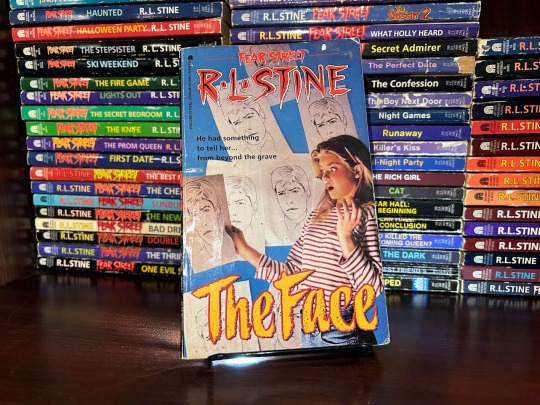
The Face managed to be one of the more enjoyable Fear Street books in spite of a few frustrating flaws. I was immediately drawn in by the premise, and I don’t think I ever could have guessed that ending. The overall concept and pacing were solid. The structure felt like a fresh break from the tried and true Fear Street formula. Martha repeatedly drawing the same face that she didn’t recognize was nice and unsettling. The book’s biggest weakness was how the entire plot relied on the terrible medical advice from Martha’s doctor. Martha and her friends experienced something traumatic last November. Martha for some reason doesn’t remember any of it. Her shitty doctor’s sage advice is that her friends are not allowed to talk with her about it ever. I’m no expert on memory loss, but this just felt cruel. I fail to see how it served any purpose aside from furthering the plot. Then the whole book culminated in a giant info dump by the one who turned out to be the villain. I could have been a lot more forgiving of the whole bad-doctor-as-plot-device if it weren’t for the villain-tells-all infodump at the end, but that’s not the book that was written. It’s safe to say that R.L. Stine definitely has a thing for bad doctors, convoluted villain logic, and twisted revenge plots. In spite of my issues with all of those things, I still managed to enjoy the book. I think that’s a testament to its strengths in other areas. The Face may have fallen short of the best Fear Street titles, but it did manage to break the mold enough to be interesting.
Score: 3
My full review with memes, snark, and spoilers can be found here: https://www.danstalter.com/the-face/
#fear street#rl stine#books#book reviews#lit#lit review#nostalgia#fits of nostalgia#the face#paperbacks from hell#90s#90s kids#book#blog
5 notes
·
View notes
Text
currently on day 2 of trying to hit my 4-article-a-day goal. but having to analyse articles after 8 hours of teaching is just painful.
0 notes
Text
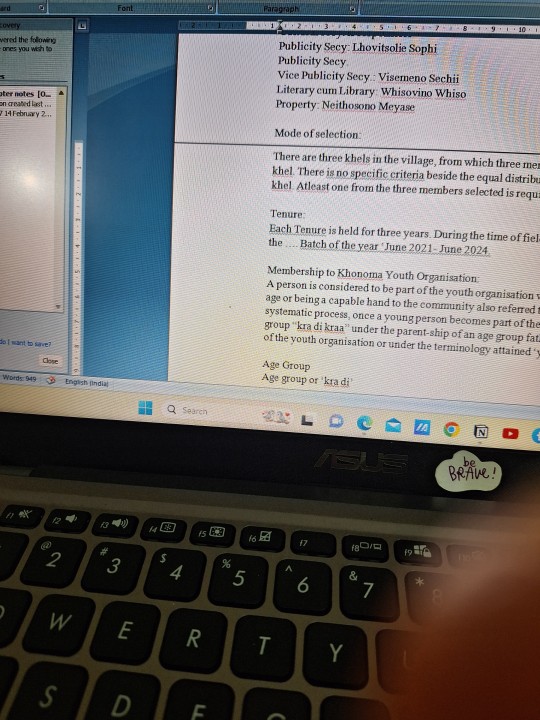
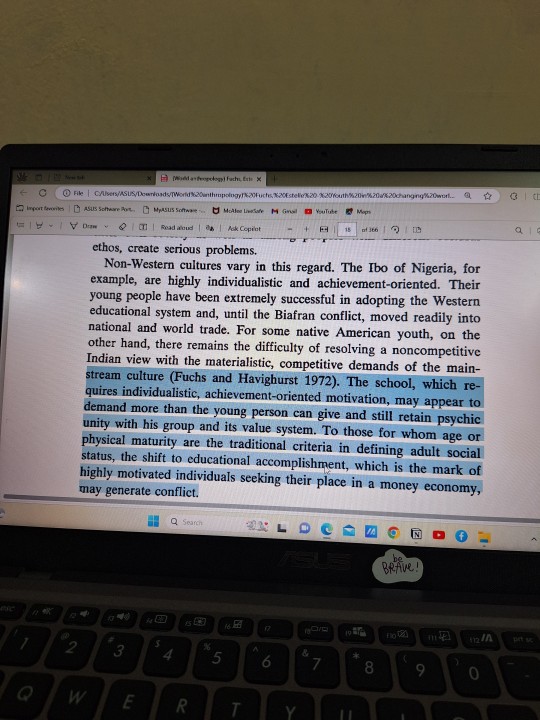
#5 of 100dop
My productivity towards thesis work is very small compared to how much I need to work on. Anyway here's to day 5.
I wrote my data collected from an interview during fieldwork and also read the introduction part of a book youth in changing cultures.
The article made me realise how I and many other young people from my region are in the same or similar experiences as those from that time of young people around 1970s. The ever changing culture that have ushered in the delay of adulthood and elongated years in education or unemployment. Though this has been a time of leisure for the privileged, for those from rural or low income and living in urban areas have had no option but take up adult responsibilities in their youth.
1 note
·
View note